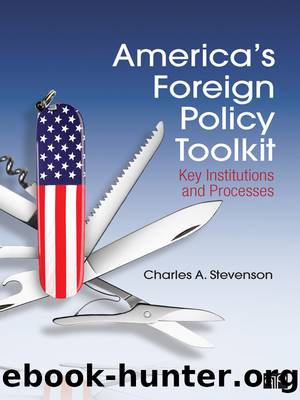America's Foeign Policy Toolkit: Key Institutions and Processes by Charles A. Stevenson

Author:Charles A. Stevenson [Stevenson, Charles A.]
Language: eng
Format: epub
Tags: International Relations, Public Policy, National, Political Science, American Government, General
ISBN: 9781608719853
Google: gxRssvqRvb0C
Goodreads: 15954222
Publisher: CQ Press
Published: 2012-10-02T00:00:00+00:00
Trade
As an instrument of policyâin order to persuade other nations to act in particular waysâtrade is most powerful when used negatively through restrictions or suspensions. But, trade relationships are also positive forces for political cooperation and economic growth. The United States seeks trade agreements both for economic benefits and for the political goodwill that can accompany good trading arrangements. On the other hand, trade disputes can exacerbate tensions in other areas, especially because trade is, for many nations, a leading foreign policy concern.
Congress is a necessary player for trade to be a policy instrument. The legislative branch sets tariffs and special trade preferences as well as authorizing negotiations for multilateral agreements. Protrade lawmakers endorse the idea that freer trade has economic benefits for all nations, but they are often held in check by legislators concerned about job losses and industrial decline in their home areas. These parochial concerns, understandably, have weakened some of the political benefits of trade deals as Americans resisted threats to domestic textile and steel companies, for example, and Koreans resisted threats to their automobile and cattle producers.
Trade preference laws are a major way of promoting economic growth in less-developed countries by allowing certain specified imports into the United States. The 1974 Generalized System of Preferences (GSP) provides benefits to more than 130 less-developed countries. Under GSP, the president can grant duty-free status to selected imports from qualifying nations. Certain conditions apply, such as reasonable market access, worker rights, support for U.S. antiterrorism programs, and not engaging in practices that would harm U.S. economic interests. Many agricultural, textile, apparel, and import-sensitive products are excluded. In addition to GSP, several regional trade preference programs have been adopted in recent decades, including ones for the Caribbean Basin, Central America, Andean nations, and Africa. Each law has to be extended periodically.24
Free trade agreements (FTAs), regional and bilateral, have been used frequently in recent years both for their economic benefits and for the associated political benefits. The negotiations generally seek to eliminate tariffs and nontariff barriers on trade in goods and services. Collateral agreements on investment, intellectual property rights, labor practices, and environmental protection are often demanded by Congress and become part of the negotiating agenda. FTAs have been negotiated by the USTR under time-limited power given by Congress to the president, originally called fast track and now renamed Trade Promotion Authority (TPA). From Congressâs perspective, TPA is a self-denying process where legislators surrender their tariff-setting power in order to avoid dismemberment of multilateral agreements by parochial amendments. Under TPA, Congress allows only an up-or-down vote on the package. But, the trade committees insist on, and have been granted by USTR, close consultations during the negotiations process, so they can raise concerns and try to forestall objectionable outcomes.
When major international talks on trade liberalization have stalled, U.S. administrations rushed to sign bilateral or regional free trade agreements. America currently has such pacts in force with Israel, Canada, Mexico, Jordan, Australia, Singapore, Morocco, Oman, Bahrain, Chile, Peru, Dominican RepublicâCentral America, andâin 2011âColombia, Panama, and South Korea.
Download
This site does not store any files on its server. We only index and link to content provided by other sites. Please contact the content providers to delete copyright contents if any and email us, we'll remove relevant links or contents immediately.
Collaborating with Parents for Early School Success : The Achieving-Behaving-Caring Program by Stephanie H. McConaughy; Pam Kay; Julie A. Welkowitz; Kim Hewitt; Martha D. Fitzgerald(899)
Entrepreneurship Education and Training: The Issue of Effectiveness by Colette Henry Frances Hill Claire Leitch(665)
Adding Value to Policy Analysis and Advice by Claudia Scott; Karen Baehler(499)
Materializing the Middle Passage by Jane Webster;(497)
Race and American Political Development by unknow(488)
Sociological Perspectives of Health and Illness by Constantinos N. Phellas(478)
American Government and Politics Today by Steffen W. Schmidt Mack C. Shelley Barbara A. Bardes(477)
Human and Global Security : An Exploration of Terms by Peter Stoett(473)
Control Of Oil - Hardback by Kayal(466)
Advances in Child Development and Behavior, Volume 37 by Patricia J. Bauer(403)
The Disappearance of Rituals: A Topology of the Present by Byung-Chul Han(401)
The Catholic Church and European State Formation, AD 1000-1500 by Jørgen Møller(392)
The World According to China by Elizabeth C. Economy(382)
Theories of Counseling and Psychotherapy: A Case Approach by Nancy L. Murdock(371)
Left Is Not Woke by Susan Neiman(370)
Application of classical statistics, logratio transformation and multifractal approaches to delineate geochemical anomalies in the Zarshuran gold district, NW Iran by unknow(364)
Cross-Cultural Child Development for Social Workers by Lena Robinson(358)
Turkey's Relations with the West and the Turkic Republics: The Rise and Fall of the Turkish Model by Idris Bal(353)
Japan's Ainu Minority in Tokyo by Mark K. Watson(340)
